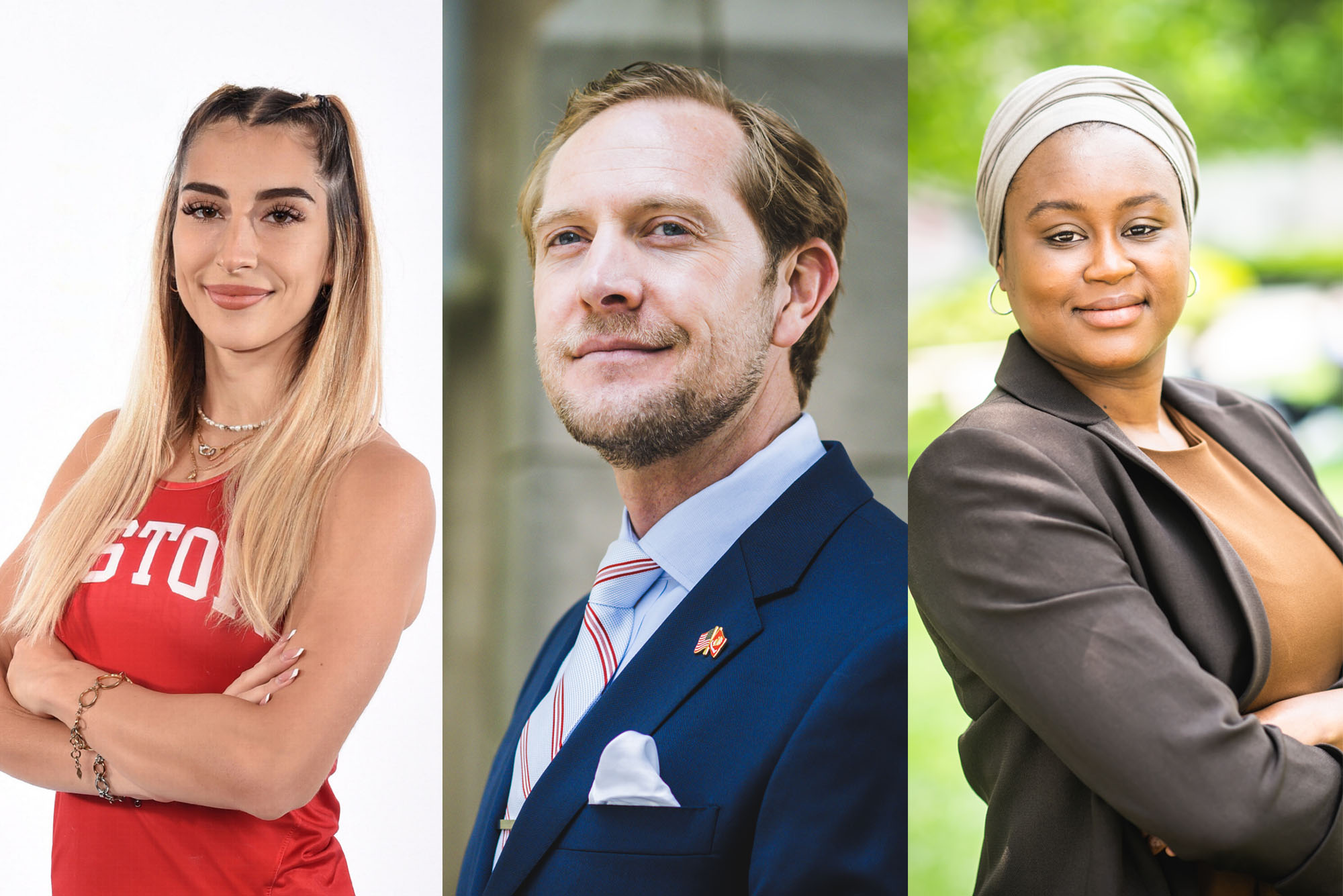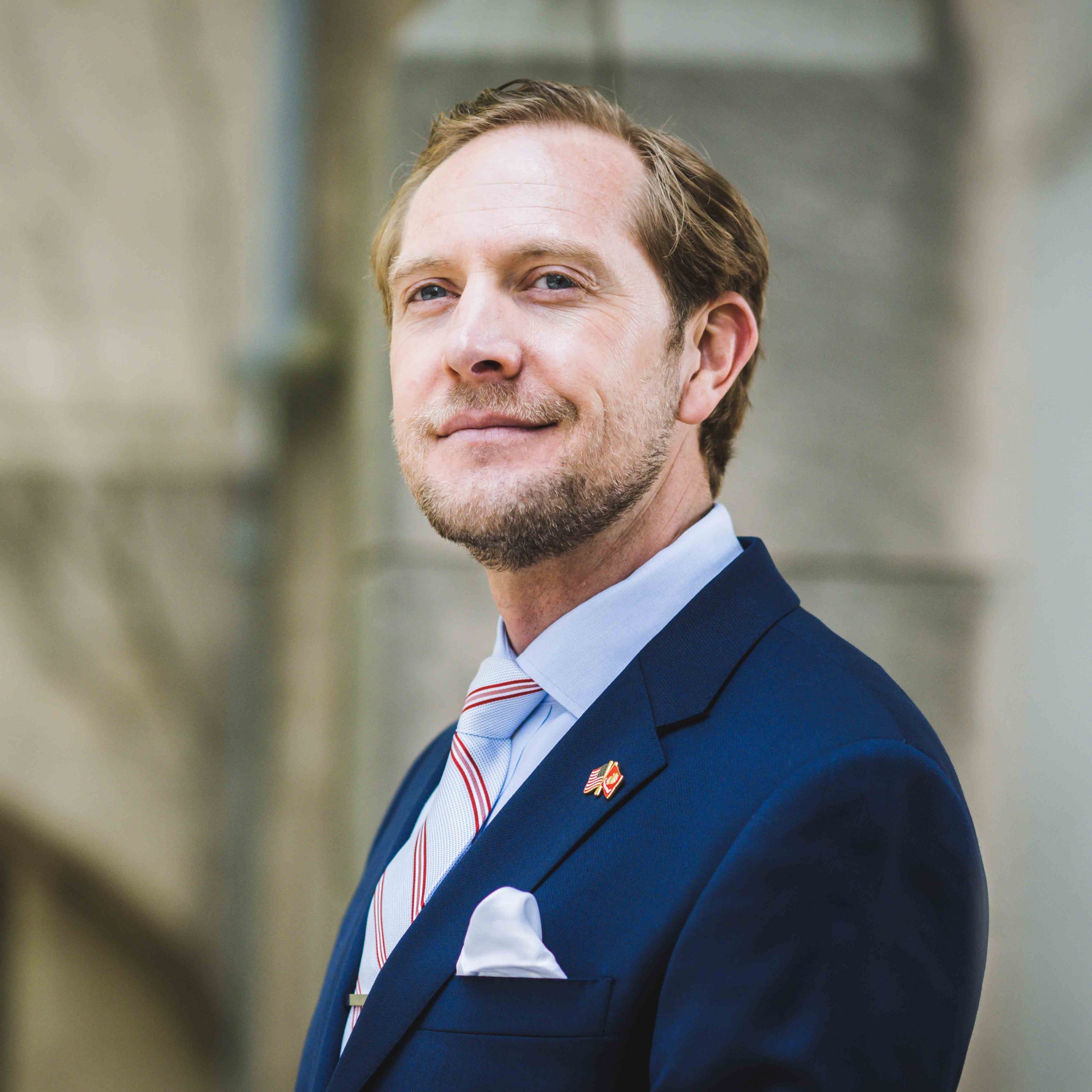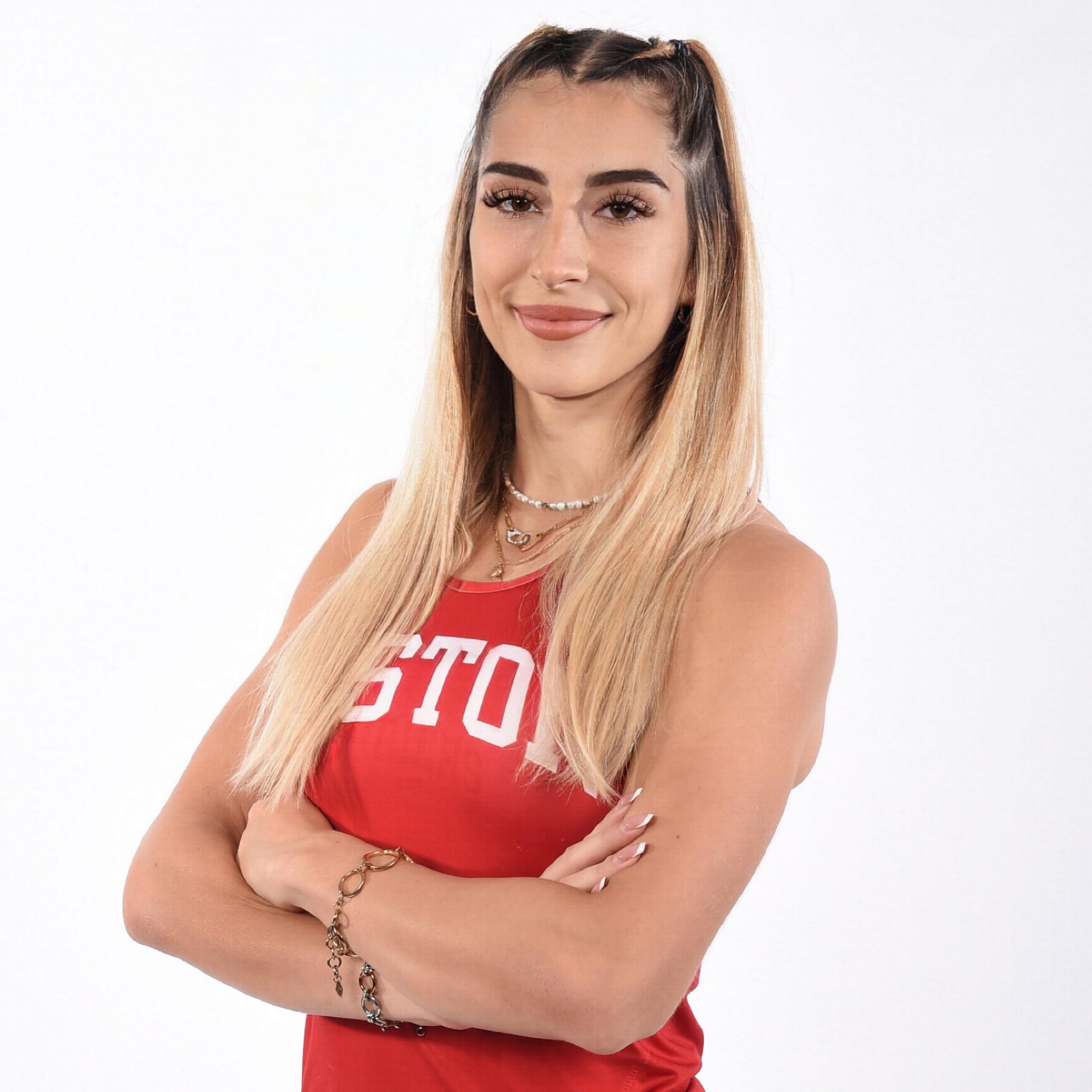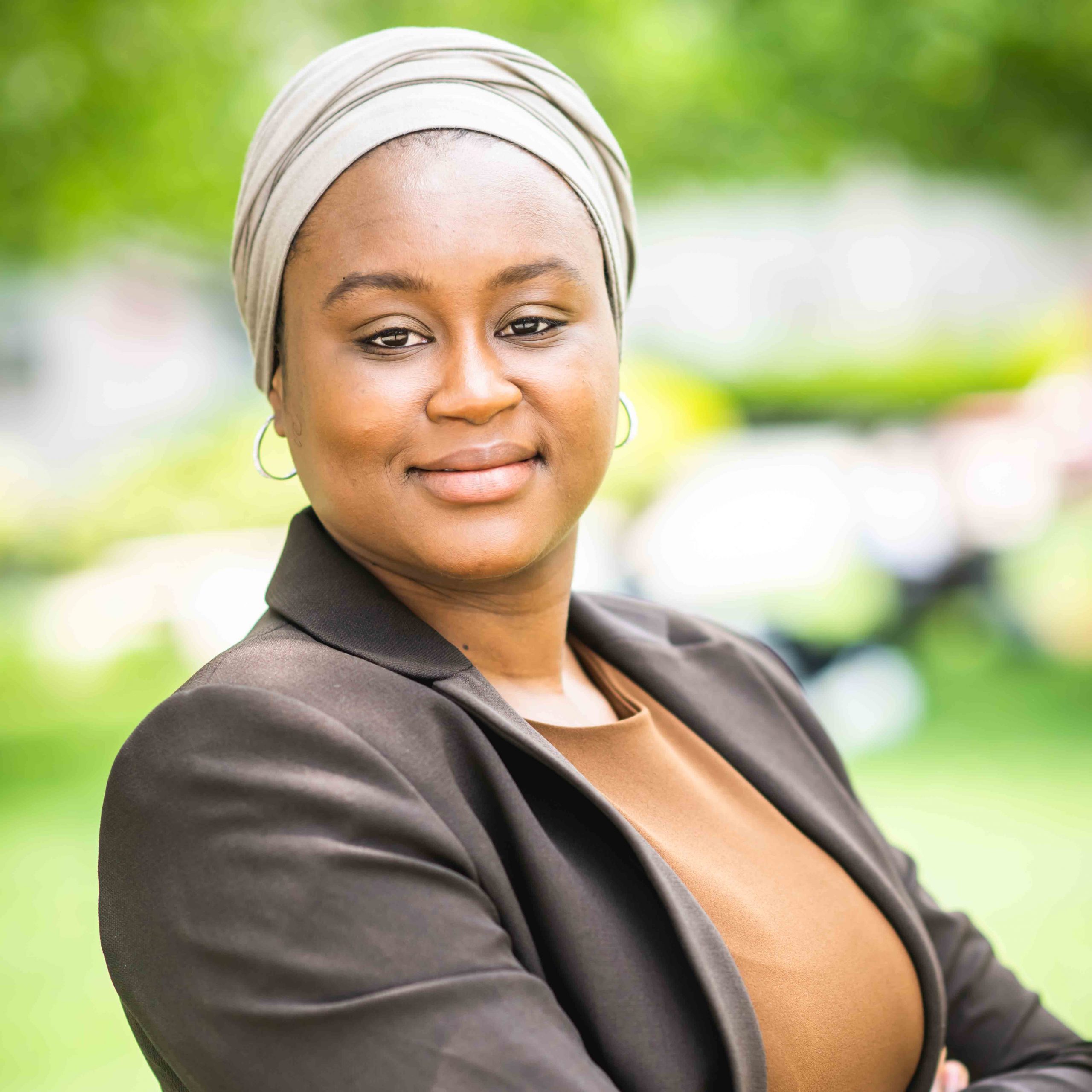Meet Three Inspiring Master’s Students from the Class of 2023

Class of 2023 master’s students Emma Montoya (CAS’22, GRS’23), Brian McPherson (Questrom’23), and Nabila Adamu (SPH’23). Photos by Boston University Athletics (Montoya) and Jackie Ricciardi (McPherson, Adamu)
Meet Three Inspiring Master’s Students from the Class of 2023
Their studies cover neurobiology, epidemiology, and healthcare management; their stories are models of leadership and inspiration
Approximately 3,380 of the caps tossed in the air this weekend at Boston University will belong to advanced-degree graduates.
For these master’s, doctoral, and professional students, Commencement marks the culmination of years of dedicated scholarship and study, often while juggling responsibilities outside of schoolwork that undergraduates have not yet encountered. Although the long hours spent running experiments at the lab or writing dissertations may be over, the impact these soon-to-be ex-Terriers will have on the world is just beginning.
Every year, BU Today highlights three impressive advanced-degree candidates from the graduating class. This year’s students are from the Graduate School of Arts & Sciences, the School of Public Health, and Questrom School of Business. Their stories are inspiring and compelling.
Brian McPherson

There’s a world of difference between leading 50 Marines through a combat environment and, say, creating slides for a group project.
As many ex-service members will tell you, reentering civilian life often comes with a significant adjustment period. For Brian McPherson (Questrom’23), a former Marine Corps sergeant, his just happened to be graded.
After an injury forced him to leave the Marines, McPherson went on to get a bachelor’s degree in community health from Ohio University. Going back to school was a challenge in its own right—“I hadn’t sat in a classroom for nearly six years,” McPherson says, laughing—but it also required him to reevaluate who he was and what he wanted to do with his life.
Transitioning out of the Armed Forces, “I had to let go of the identity of being a Marine, and that was really difficult,” he says. “I was so connected to this community and these amazing individuals, and I had to let that go in order to create a new identity and write the next chapters [of my life].”
Eventually, his college experience led him to a new kind of service: giving back to the communities around him.
McPherson’s college career was in part made possible by the Semper Fi & America’s Fund, a nonprofit that supports wounded service members and veterans. He proceeded to work for the fund full-time after graduation, climbing to a senior manager position.
First, that job allowed him to “give back to the nonprofit that had given so much to me, and impact other service members and their families through my work,” McPherson says. But it also set him on a clear career path: “I wanted my next step to be working for a big healthcare corporation and creating a larger impact in the nation,” he says. “My goal was making it to the C-suite of a major company so that I could be in a position to create better access to healthcare services and decrease costs.”
Enter: business school.
McPherson came to Questrom School of Business in 2021 to pursue a master’s in business administration in healthcare management. Here, he learned the analytical skills he knew he needed to enter the corporate healthcare world. He put them into practice last summer at an internship with CVS Health in pharmacy operations, and now he’s set to work for CVS full-time after graduation.
He also leaned into what he calls the “human element” of business. His Questrom courses emphasized that business is about more than just bottom lines—it’s about the individuals who comprise an organization. An organization can’t succeed if workers aren’t respected or supported.
That resonated with McPherson’s Marines background. “Being business-ready today is a lot like being combat-ready: if everybody isn’t 100 percent ahead of deployment [or a project], the whole team will suffer, not just individuals,” he says. “I found myself checking in on my classmates the same way I was checking in with Marines in 2007.”
McPherson also served as president of Questrom’s Veterans Club while at BU. Additionally, he was the driving force behind Questrom’s inaugural Day of Service, which saw almost 300 students and staff volunteer at organizations across Greater Boston in March.
Of all of his accomplishments while at Questrom, the Day of Service is probably the one he’s most proud of.
“I worked at a nonprofit, so I know how valuable volunteers are,” McPherson says. “But what’s most of value here is the seeds it hopefully planted in students. If even one person goes to work for a company and is like, ‘Hey, I did this cool thing in college where we volunteered for a day and we should do that here, too’—the impact that has on human capital is big.
“Fostering that kind of leadership in the next business leaders of the world is meaningful.”
Emma Montoya

If Emma Montoya (CAS’22, GRS’23) could give 200 percent, she would.
The athlete and soon-to-be Graduate School of Arts & Sciences grad spent her entire BU career balancing two different, but equally intensive disciplines: track and biology.
Somehow, she made it all look easy. After earning her undergraduate degree in biology/premed from the College of Arts & Sciences, Montoya sailed through the master’s program in neurobiology with a 3.93 GPA. On top of that, she broke a longstanding school record for the 400 meters earlier this year with a time of 53.34.
And, oh, right: that was after recovering from pericarditis, an inflammatory heart condition caused by her long COVID symptoms that prevented her from running for a full year.
Montoya’s success was surprising to everyone but her.
“My doctors are still shocked that I could run all summer,” Montoya says, referring to the outdoor track season in her native Nice, France, where she made it to nationals the summer before starting her master’s program. “No practicing and not being able to breathe very well”—her pericarditis also came with lung inflammation—“really motivated me [for the BU season]. I was like, ‘If I did this well after everything, if I practice properly, maybe I can do even better.’”
But that’s just how Montoya operates.
A deep love for both athletics and science—she ultimately wants to be a veterinarian—brought Montoya to the United States in the first place. In France, she says, students often have to choose between school and sports. Premed studies would have been impossible for her to pursue while also running competitively. So, Montoya spent her freshman year at Christian Brothers University in Tennessee before being recruited to run for BU.
As for what it is about track that she likes so much? That it’s hard, of course.
Montoya initially started out competing in triathlons. But the running aspect really spoke to her: “I just fell in love with the sport, and the fact that it’s time-consuming and hard, and everything about it,” she explains. (Note that her favorite events are the 400 meters and the 400-meter hurdles, two of the most notoriously grueling track and field races.) “Being able to set goals and work all year to try and accomplish them—I really like that, too.”
And on the science side, Montoya has wanted to work with animals from a young age. She knew she needed a biology degree in order to apply to vet school. As she dug into her CAS classes, she also developed an interest in psychology and brain sciences. When it came time to pick a master’s program—to utilize the extra year of eligibility granted to college athletes because of COVID-19—she immediately latched onto neurobiology. “I wanted to learn more about brain tumors and Parkinson’s and Alzheimer’s diseases and things like that,” she explains.
She does still plan to go to vet school in the future. She deferred acceptance to a veterinary program in Ireland to get her master’s and is planning to defer once more: after graduation, she has a job lined up in the research lab of Thomas Gilmore, a CAS and GRS professor of biology and director of the Molecular Biology, Cell Biology & and Biochemistry program.
If there’s anything Montoya took away from her time at BU—a rigorous academic schedule, coronavirus, and one hell of a comeback included—it’s that results will happen as long as you commit to putting in the effort.
“I think that if you wake up every morning and put in 100 percent effort, you can do anything,” she says. Patience matters, too—“Sometimes, if you want to achieve a goal too quickly, you get a little disappointed,” she continues. “I feel like any little step in the right direction is a win. A little step is enough to make big things happen in the future.”
Nabila Adamu

Nabila Adamu (SPH’23) spent much of the coronavirus lockdown working as a pharmacist in her native Nigeria. She knew she was making an impact in her community—dispelling vaccine misinformation here, offering advice for social distancing there—but she couldn’t stop thinking that she could do even more.
It didn’t take long for her to decide that a master’s in public health would help her create the larger-scale impact she was interested in.
As a pharmacist at a small teaching hospital, “I was only interacting with individuals,” Adamu says. She started thinking, “‘Okay, MPH degrees focus on community health, and the way to make the best impact is by educating the community.’ When you educate the community [at large], you can prevent a lot of negative incidents.”
So, she came to BU.
Adamu started at the School of Public Health in 2021. Once she got here, her approach quickly became “yes, and…” She studied epidemiology and biostatistics and global health program design and evaluation. She did a practicum at Brigham and Women’s Hospital educating African-born women living in the States about HIV prevention. Her class research projects included everything from public perception of COVID-19 to food insecurity among college students.
One of her favorite courses covered neglected diseases, or infectious diseases like leprosy and ringworm, that largely impact underdeveloped countries. In many places, “there is not much prevention or education regarding [these diseases],” Adamu says. “That class made me think that there’s a lot for developed countries to do in improving people’s quality of life in the whole world.”
Adamu also spent plenty of time working with programs at SPH.
She didn’t know anyone when she first arrived in Boston as an international student. That changed almost as soon as she walked into the office of Mary Murphy-Phillips, assistant dean of students and director of the Graduate Student Life (GSL) team at SPH. “I call her my mom—seriously!” Adamu says, crediting Murphy-Phillips with helping her adjust to life in the States and advising her to try new things. Adamu ultimately joined SPH’s student government as an international student representative and signed up to be a mentor in the GSL’s International Students Success Program.
Her classes and opportunities led Adamu to a found family within SPH, she says.
“I came to BU knowing no one, and I ended up having people that became mothers, uncles, and sisters,” she says, adding she was initially nervous she wouldn’t be accepted for wearing a hijab.
“I met my community here. If I go out, everyone says hi, and if I’m not in the building for two days, it’s like, where’s Nabila? The way people show me how much they care about me—it’s an outstanding memory for me.”
She’s still solidifying what she wants to do after graduation. Policy, research, education, and prevention—whatever lets her effect positive change regarding infectious diseases, she’ll do it, she says. Her big ambition is to one day return to Nigeria to work with the large population of children living on the street.
That’s why Adamu pursued her master’s in public health in the first place—to help the people “the world doesn’t care about,” she says.
For her, it all comes back to impact. Newly armed with her diploma, she says, her mantra is: “How do I use my public health knowledge to give people the quality of life they should have?”

Comments & Discussion
Boston University moderates comments to facilitate an informed, substantive, civil conversation. Abusive, profane, self-promotional, misleading, incoherent or off-topic comments will be rejected. Moderators are staffed during regular business hours (EST) and can only accept comments written in English. Statistics or facts must include a citation or a link to the citation.